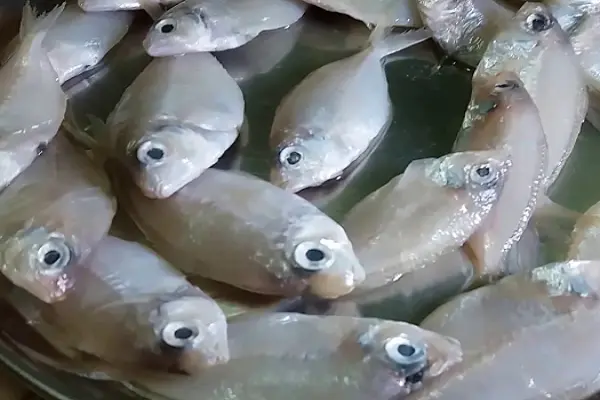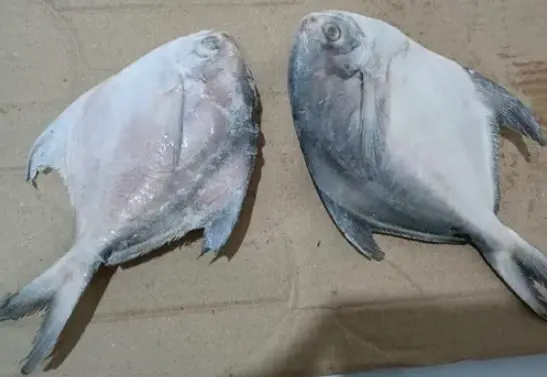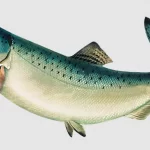Gerres subfasciatus is the logical name of karapodi fish. It is additionally realized by various normal names like silver belly roach, ovate silver biddy, common silverbiddy, and Southern silver biddy.
Karapodi fish has a place with the types of mojarra which is local to the Indian and Pacific Oceans. Mojarra family contains hard fish groups. This fish goes under least worry on preservation status.
Karapodi / Khapi Fish – All You Need to Know About

The logical category of karapodi fish.
- Kingdom: Animalia.
- Phylum: Chordata.
- Class: Actinopterygii.
- Order: Perciformes.
- Family: Gerreidae.
- Genus: Gerres.
- Species: G. subfasciatus.
This fish can be recognized by its silver-hued body with an exceptionally protrusible jaw and a long dorsal blade. It can grow a limit of 20 cm long and weigh around 2-3 Kg.
Khapi fish isn’t viewed everywhere, except it is just tracked down around the Indian Ocean and the Pacific Ocean close to seaside Australia. This fish is generally utilized as prey and trapped by fish catchers in Australia and different places habitually. However, individuals likewise eat it as food, particularly in India.
The dried khapi fish is all the more ordinarily consumed in India which is ready by drying whole fish in high daylight for a more drawn-out period. After all the water follows dissipates it will be protected and will be accessible for an extremely extensive stretch.
Karapodi/Khapi Fish in English
Khapi/Karapodi fish in English is called silver belly fish. Silver belly fish is for the most part known as Khapi fish in Konkani which is an official language of Goa and by Karapodi in Tamil.
Karapodi fish (silver paunch) is called Mullan/Karal in Malayalam, Kavel in Tamil, Gang chanda in Bengali, and Poni fish in Marathi.
Khapi/Karapodi fish Price
Khapi fish is definitely not a modest fish like basa or catfish (Etta koori) however it goes under a tag of medium reach fishes like rohu and catla.
Its typical cost goes from Rs. 400 to 1200 for every Kg in India. In Goa and Mumbai, it is marginally costly because of the business esteem as the travel industry overwhelms regions while somewhat less expensive in places like Kerala and Hyderabad.
You can likewise purchase Khapi/Karapodi online which decreases the gamble of getting incorrectly fish and furthermore save your important time.
Karapodi Fish Benefits
Karapodi fish is relatively high in minerals like phosphorus and calcium from different fishes. It additionally contains all fundamental minerals as other fish contain like iron, zinc, magnesium, potassium, and sodium. These minerals are vital for making compounds and chemicals. Minerals additionally assist human organs with loving heart, mind, and lungs to appropriately work.
Like other fish, it additionally contains omega-3 fatty acids and B-12 nutrients. The omega-3 fatty acids further develop heart health and lessen circulatory strain and cholesterol levels in the blood. While B-12 nutrients revived the mind by supporting more oxygenated blood in the brain.
Karapodi fish contains a high measure of protein and extremely low fats which is really great for shedding pounds and building muscle. Particularly for the people who are working out, it is extremely charming for them as it helps in weight reduction as well as alleviates stress.
The dried karapodi fish is exceptionally low in mercury and high in selenium. The dried fish is particularly scrumptious and exceptionally simple to get ready.
Karapodi Fish Health Benefits
Silver belly/Karapodi fish can be recognized by its silver-hued body with an exceptionally protrusible jaw and a long dorsal fin. It can grow a limit of 20 cm long and weigh around 2-3 Kg. This fish is generally utilized as prey and trapped by fish catchers oftentimes.
Be that as it may, individuals likewise devour it as food, particularly in India. The dried fish is all the more regularly consumed in India which is ready by drying whole fish in high daylight for a more extended period. After all the water trace vanishes it will be saved and that will be accessible for an extremely extensive stretch.
Health advantages
- Karapodi fish is nearly high in minerals like phosphorus and calcium from different fishes.
- It additionally contains all fundamental minerals as other fish contain like iron, zinc, magnesium, potassium, and sodium. These minerals are vital for making catalysts and chemicals. Minerals additionally assist human organs like the heart, mind, and lungs to appropriately work.
- Like other fish, it additionally contains omega-3 unsaturated fats and B-12 nutrients. The omega-3 unsaturated fat further develops heart health and decreases circulatory strain and cholesterol levels in the blood. While B-12 nutrients revived the brain by supporting more oxygenated blood in the mind.
- Karapodi fish contains a high measure of protein and extremely low fats which is really great for getting thinner and building muscle. Particularly for the people who are working out, it is exceptionally wonderful for them as it helps in weight reduction as well as alleviates pressure.
The dietary benefits of Karapodi Fish or Silver Belly Fish
- Energy (Ecals): 91
- Moisture (gm): 76
- Protein (gm): 19
- Fat (gm): 2
- Mineral (gm): 3
- Fiber (gm): Nil
- Carbs (gm): 0
- Calcium (mg): 715
- Phosphorus (mg): 741
- Iron (mg): 2.
Karapodi Fish Recipe
This is the first time I have attempted fish kuzhambu with this karapodi/horse fish. It tastes great when we make it with chettinad style. Fish kuzhambu tastes truly magnificent when ready with newly ground masalas.
Generally, fish kuzhambu tastes great the following day however when you add newly ground masalas and cook appropriately the masalas it tasted great that very day itself. Pony fish/silver belly fish is usually found in Tamil Nadu and it tends to be recognized effectively by its silver tone.
This fish kuzhambu can be presented with inactively, dosa, or hot steamed rice. This is a magnificent menu for nonveg visitor lunch thoughts. You can present with warm steamed inactively toward the beginning of the day or with steamed rice with fish fry and fish kuzhambu or with rasam.
Ingredients
For making masala paste.
- 2-3 tsp oil.
- 1 tsp cumin and 1 tsp fennel.
- 1 tsp pepper corns.
- Shallots and onion 200 gms.
- 3 tsp coriander seeds.
- 1 inch ginger slashed and garlic 5-6 cloves.
- 5-6 red cold.
- 1/2 shell ground coconut.
For making fish kuzhambu.
- 3 tsp sesame oil.
- 1/4 tsp of fenugreek.
- Curry Leaves/கறிவேப்பிலை.
- 1 tsp turmeric powder.
- tomato glue – ground 5 tomatoes.
- 2-3 tsp crisp powder.
- Tamarind juice.
- Soaked a lemon.
- estimated tamarind.
- Cleaved coriander leaves.
- 1 kg Pony fish.
![50+ Fish Names In Tamil With Pictures [English Tamil Fish Names] Fish Names In Tamil With Pictures](https://thefishblog.com/wp-content/uploads/2022/08/Fish-Names-in-Tamil-150x150.webp)




![Basa Fish In Kannada [Name, Photos, Benefits, Price and More] Basa Fish In Kannada Name](https://thefishblog.com/wp-content/uploads/2022/08/Basa-Fish.webp)
![Pomfret Fish In Tamil [Name, Photos, Price, Benefits] Pomfret Fish in Tamil Name](https://thefishblog.com/wp-content/uploads/2022/08/Pomfret-fish-nutrition.webp)
![Rohu Fish In Tamil [Name, Photos, Benefits, Price & More] Rohu Fish in Tamil](https://thefishblog.com/wp-content/uploads/2022/08/Rohu-Fish-In-Tamil-150x150.webp)